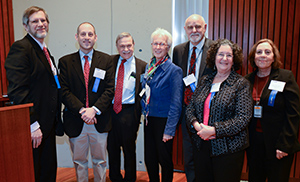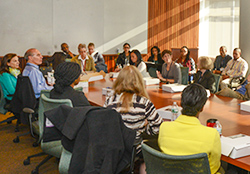

Global Best Practices
Einstein Hosts Conference on Advancing Global Health
On a recent November morning, the sun streamed through the floor-to-ceiling windows, warming the atrium adjacent to LeFrak Auditorium, where guests mingled before the start of the day-long conference "Advancing Global Health: Education, Building, and Supporting." Co-hosted by Einstein's Global Health Center (GHC) and the Montefiore-Einstein Center for Continuing Medical Education, the event sought to address important best practices among members of the global health community from throughout the nation.

Hosts and conference attendees (from left): Drs. Lou Weiss (GHC co-director), Jon Ripp, Oliver Fein, Kathy Anastos (GHC co-director), Stephen Hargarten and Judith Lasker with GHC manager Jill Raufman"In recent years, the popularity of global health programs has grown substantially," noted Jill Raufman, manager of the GHC and director of the Global Health Fellowships Program. "Increasingly, undergraduate students are seeking out global health opportunities before entering medical school and it's critical that we share best practices to shape the best possible experiences that meet the varying needs of the individuals who take part."
Providing Focus for Discourse
To begin the day, Dr. Louis Weiss, co-director of the GHC and professor of pathology and of medicine, welcomed those in attendance and acknowledged the conference's organizers, in particular Ms. Raufman. "This is the second conference that we've hosted and, in each instance, Jill has assembled a wonderful team of presenters, along with important platforms for discussing our aims and how we can improve our programs."

Conference attendees gather for one of three lunchtime conversations offered as part of the day's eventsIn his remarks introducing the day's plenary speaker, Dr. Allen M. Spiegel, the Marilyn and Stanley M. Katz Dean at Einstein, touched on the importance of basic research in addressing global issues, citing investigations into Ebola virus by Einstein's Dr. Kartik Chandran, which are contributing to the development of new robust point-of-care diagnostic tests. Dr. N. Regina Rabinovich, ExxonMobil Malaria Scholar in Residence at the Harvard School of Public Health, then discussed "Advancing Global Health: Perspectives."
"Eradicating malaria is an audacious goal," noted Dr. Rabinovich, who has previously served as director of the infectious diseases unit at the Bill & Melinda Gates Foundation. "If we don't eradicate it, we fail. Or we can ask ourselves "which 20 percent of children do we want to die?'"
The morning session, which focused on building sustainable global partnerships, featured seven speakers, including Sister Esther Mwangi and David Dennis Okello joining via teleconference from Kenya, and Dr. Jennifer Hatfield joining from Calgary, Canada, followed by Shelly Terrazas from Emory Global Health Institute and Dr. Jessica Evert, from CFHI, who each discussed building global partnerships from varying perspectives . Each speaker described the challenges of identifying and employing resources available to build sustainability in global health efforts.
A panel discussion followed, which touched upon the success of Rwanda's health insurance system. Attendees were interested to learn that Rwanda currently covers approximately 96 percent of its citizens. "It seems our own nation has something to learn from Rwanda's success," noted one individual.

A photo exhibit along Einstein’s "Main Street," in the Forchheimer lobby, showcases images taken by Einstein students while taking part in the Global Health Fellowship ProgramOver lunch, attendees could choose among three topics for taking part in lively conversations— case studies of ethical challenges in global health; laboratory capacity building in the developing world; and global health partnerships.
Addressing Critical Travel Issues
Because an increasing number of students, faculty, staff, and their families are now traveling abroad—often to places presenting a high level of biological, non-biological or psychological risks—the afternoon's speakers discussed the role and responsibilities their institutions have in managing risk and ensuring safety for those pursuing global health experiences and medical education.
A panel that included Drs. Stephen Hargarten, Robert Quigley, Judith Lasker, Oliver Fein and Jonathan Ripp also addressed the benefits of traveling abroad.
"A stay of less than three weeks is beneficial neither to volunteers nor hosts," commented one panelist.
The panelists advised students to consider volunteering with local community groups in addition to their more global pursuits. "Vulnerable populations, such as people living in poverty or immigrants, face particular challenges requiring community-driven solutions similar to those embraced in global health," they explained.
In closing, Dr. Weiss encouraged conference participants to visit Einstein's "Main Street" where the photo exhibit "Global Vision: The Einstein Community Abroad," highlights photos taken by Einstein's Global Health Fellowship students, and to visit the Einstein Global Health Center website where videos and PowerPoint presentations of the conference talks are available.
Posted on: Friday, December 5, 2014

Tablet Blog